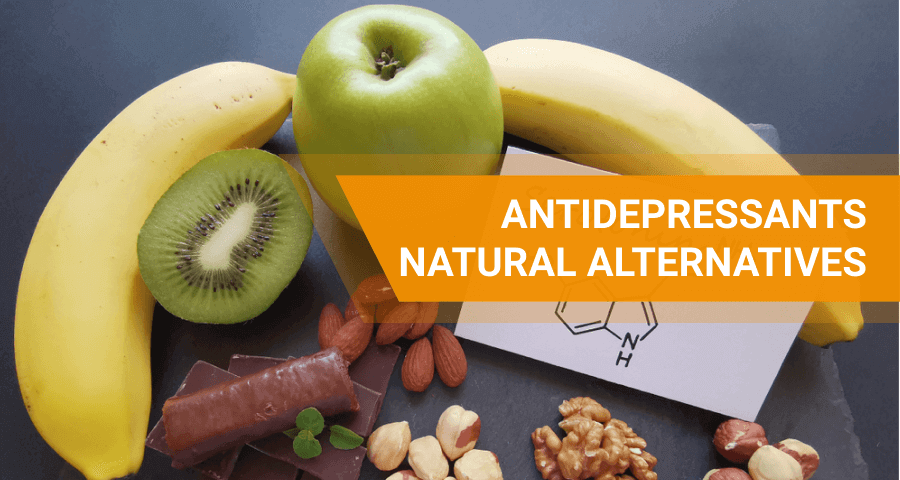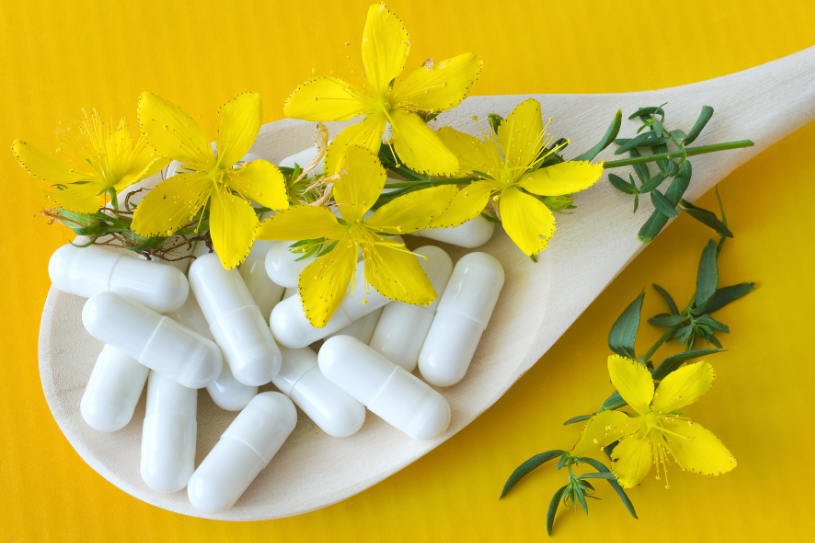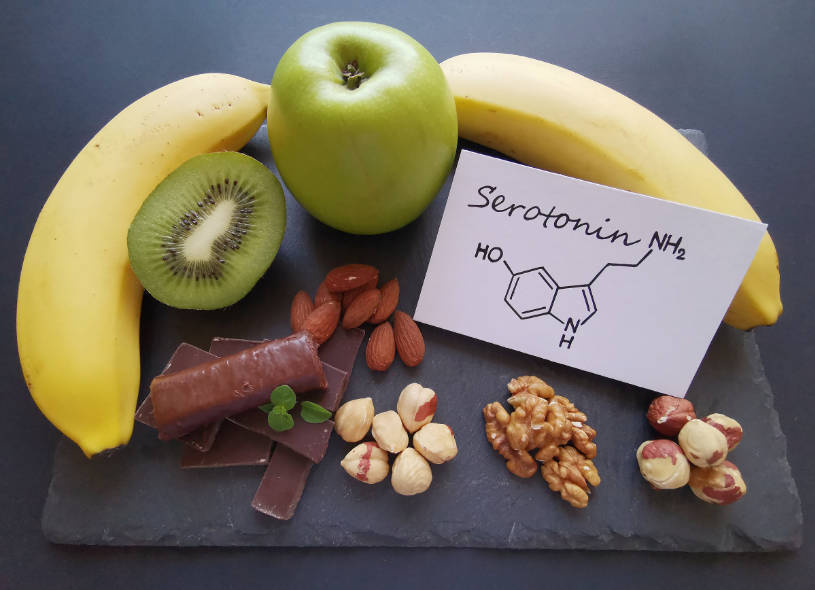
Depression is a mental disorder that is treatable with medications such as antidepressant SSRIs, Tricyclics, SNRIs, MAOIs, and atypical antidepressants drugs. However, these antidepressants come with niggling side effects like antidepressant weight fluctuation that can adversely affect one’s health.
Table Of Contents:
A study of 700 people taking antidepressants revealed that about 38% of them suffered adverse effects of the medications. To counter such effects health practitioners usually prescribe natural antidepressants. However, note that natural antidepressants cannot replace medical diagnosis and personalized prescription treatment, but in the case of mild symptoms, some herbal and dietary supplements can show improvement and relief.
Read on to discover what the alternatives to antidepressants are, treating depression without antidepressants, and whether or not they are harmful.
More About Antidepressants:
Can One Buy Antidepressants Over The Counter?
The list of MAOI antidepressants, SSRIs, SNRIs, Serotonin Modulators, and Tricyclic antidepressants contains many drugs that proved effective in treating depression. But these cannot be purchased over the counter without a prescription. One can buy only natural alternatives to antidepressants such as St. John’s wort, Omega-3 fatty acids, Saffron, SAM-e, Folate, 5-HTP, DHEA, zinc, and other vitamins and minerals without visiting a doctor. Although over-the-counter options work well for some people, there are both pros and cons of antidepressants. Some can cause adverse neuropsychiatric reactions in patients or can interact with other drugs from the list of SNRIs, SSRIs or MAOIs.
What Are Natural Antidepressants?
These are medications that are SSRI alternatives and are effective at treating the mental disorder known as depression. They work in the brain in a similar way to the mechanism of action of antidepressants and help to alleviate some of the symptoms associated with depression. Over the years, there has been a spike in the number of people using alternative medicine. For instance, WHO research notes that about 70% of the world’s population prefers alternative medicines. So, it is not surprising that more people are treating depression without antidepressants.
Some people choose alternatives to antidepressants to avoid the dangerous long-term effects of antidepressants. Others also choose SSRI alternatives to help with antidepressant withdrawal symptoms. Herbal antidepressants are readily available over the counter and may not require prescriptions. Here is a list of antidepressants OTC which have shown to be effective in treating some depression symptoms.

St. John’s Wort
One of the antidepressants OTC is St. John’s Wort. The benefits of St. John’s wort date back to ancient times, being used as an efficient herbal mental health treatment. Being one of the most popular herbal antidepressants, St. John’s Wort contains hypericin which blocks the reabsorption of serotonin, norepinephrine, and dopamine in the brain. Thus, the medication treats depression in a similar way to antidepressants. So, the blocking of the reuptake of these chemicals leads to their abundance in the brain which treats depression by making the patient “feel good”. It is reported that the plant is one of the herbal antidepressants that proved effective in treating mild to moderate severity of depression. Studies show that St. John’s Wort was effective as any tricyclic and SSRI antidepressants.
However, it comes with some side effects. Among the side effects, it is worth mentioning dizziness, dry mouth, constipation, confusion, and gastrointestinal symptoms. It should be noted that St. John’s wort can interact with some antidepressants leading to an alarming increase in serotonin.
Omega-3 Fatty Acids
Omega-3 fatty acids are believed to play an important role in depression. An imbalance in the level of Omega-3 fatty acids can cause serious health issues. Unfortunately, our bodies cannot produce these acids from scratch, and they can only be obtained from food and supplements. Studies have shown that Omega-3 fatty acids could have positive results in patients suffering from depression caused by an insufficiency of these acids.
Some side effects of omega-3 fatty acid supplements include fishy burps and stomach upset with higher doses and the possibility of increasing the effects of blood-thinning drugs. The advised dosage is no more than 3 g per day to avoid the risk of bleeding.
Saffron
One of the natural herbal antidepressants is saffron. It is very popular in areas both as a herb and a spice in countries such as China, Greece, Egypt, and India. Saffron has anti-inflammatory and antioxidant properties, and its thread-like stigma and petals have proved to be efficient in mild and moderate depression. Saffron has shown favorable short-term results in patients with depression, but more studies are needed to clarify its potential. Saffron works in the brain by increasing serotonin. The increase of serotonin regulates happiness and lessens anxiety. The herb is as efficient as an antidepressant and a clinical study of the effects of Saffron showed significant improvement in patients with depression. However, because saffron is one of the most expensive alternatives to antidepressants, many websites are selling low-quality saffron, with no health benefits. Caution is required when purchasing saffron supplements.
Some side effects of saffron include anxiety, dry mouth, drowsiness, agitation, nausea, sweating, low mood, constipation or diarrhea, headache, flushing, or allergic reactions.
Because the effects of some of these alternatives to antidepressants can be severe, patients should not use them without consulting with a doctor. No one also should replace their prescribed medications with OTC alternatives, as the reactions can be unpredictable, causing more damage than benefits.
SAM-e
S-adenosylmethionine or SAM-e is a compound that is produced naturally in the body from adenosine triphosphate (ATP) and the essential amino acid methionine. The compound is involved in methylation, a process that regulates neurotransmitters such as serotonin. Therefore, SAMe might play a role in depression. Although current research has shown that SAMe can offer positive effects in the treatment of depression, the studies were made on a small number of people. That is, a more in-depth research is needed to consider the SAMe among the treatments for depression.
SAMe can cause sweating, diarrhea, constipation, nausea, irritability, anxiety, dizziness, upset stomach, and mild insomnia.
Folate
Another option for those who choose alternatives to antidepressants over the counter is folate. Folate or B-9 is a vitamin that plays a vital role in the formation of red blood cells, cell growth, and division, protein metabolism, as well as prevention of neural tube defects. Folate deficiency may lead to anemia and major depressive disorder, among other health problems. Although folate supplements have little efficacy in treating depression, folate can boost the effects of antidepressant drugs. The drug works by modulating the levels of tetrahydrobiopterin also known as BH4. Tetrahydrobiopterin is essential in the formation of the neurotransmitters dopamine and serotonin. Therefore, folate boosts the production of BH4 which in turn regulates the production of serotonin, helping to treat depression.
A study showed that patients who were treated with folate in addition to other antidepressants registered significant improvements. Some side effects of folate include poor appetite, nausea, funny taste in the mouth, bloating or gas, feeling overly excited or depressed, trouble sleeping.
5-HTP
5-hydroxytryptophan or 5-HTP is an amino acid that the body produces from l-tryptophan, a dietary amino acid. Also known as oxitriptan, it is one of the most common SSRI alternatives. As one of the antidepressants OTC, Oxitriptan can be made into serotonin which aids in the treatment of depression. As already mentioned, serotonin is the chemical in the brain responsible for regulating mood and happiness. An increase in serotonin may result in the patient feeling happy and excited. 5-HTP might prove efficient in depression if it’s integrated into a patient management plan, not being administered on its own. With regards to its efficacy, the FDA assessed the drug but refused to include it on its list of medications approved for the treatment of depression. However, 5-HTP is contraindicated to administer this amino acid alone, as it can facilitate the depletion of neurotransmitters. Together with creatine, 5-HTP might boost the effectiveness of SSRI medication.
DHEA
Another of the herbal antidepressants that is an alternative to antidepressant drugs is DHEA or Dehydroepiandrosterone. DHEA is a hormone naturally produced by the body which helps to produce other hormones such as testosterone and estrogen. Specialists have linked changes in DHEA levels with depression. They believe that DHEA fights depression by increasing the levels of testosterone in men and estrogen in women. Several studies showed that DHEA could improve depression symptoms in patients with anorexia nervosa, schizophrenia, adrenal insufficiency, and HIV. Even if DHEA supplements are usually well-tolerated, some possible side effects include fatigue, hair loss, high blood pressure, oily skin, stomach upset, facial hair in women, changes in the menstrual cycle.
Zinc
Low levels of zinc in the body can lead to a drop in immunity and, therefore, affect mood. Studies support the use of zinc supplements as an adjuvant in depression, being efficient in reducing depressive and psychotic symptoms. Zinc is also effective in boosting the effects of antidepressants. Some possible side effects of zinc supplement intake include diarrhea, headaches, stomach pains, vomiting, loss of appetite, nausea.
Many other vitamins and minerals have shown positive outcomes when it comes to depression. Some of the most important ones are inositol, chromium, and vitamin B12. Because the body is not able to take all the vitamins and minerals from food, taking supplements might prove useful in boosting the number of vitamins and minerals that might be efficient in treating depression.

Natural Antidepressants: Efficacy & Harm
Natural antidepressant supplements have their benefits when it comes to depression, contributing in one way or another to diminish the effects of this medical illness. But what many people do not know is that sometimes supplements can cause more harm than good.
- First of all, herbal antidepressants are not monitored by the FDA, so the patients can’t be sure what they buy and whether it is safe. Research is needed and doctor’s advice before starting any dietary supplement. Check what they contain and buy them from reputable companies only.
- Secondly, supplements can interfere with prescription antidepressants for depression, causing dangerous interactions, putting the patient’s health in danger.
- Thirdly, taking too many supplements can lead to unpleasant side effects such as nausea, vomiting, diarrhea, fatigue, stomach cramps, headaches, hair loss, or mild nerve damage, among others.
It is highly unrecommended to use natural alternatives to antidepressants without a doctor’s consultation. In the case of developing an addiction, patients should seek proper treatment as soon as possible.
What Can Help Depression besides Medication?
People who don’t like taking drugs or supplements wonder what can help depression besides medication. Fortunately, there are several ways of treating depression without antidepressants. Some of these ways include meditation, physical exercise, a change in diet, and getting more sleep. These methods require constant practice if they are to be effective.
Physical Exercise
Putting about a half-hour a day of exercise into a daily routine can go a long way to help with depression and antidepressant addiction. A clinical study revealed that Physical exercise helps to lift mood and reduce anxiety, which is a major trigger of depression. Physical exercise doesn’t have to be strenuous or it might be counterproductive. It is advisable to take physical exercise outdoors, as fresh air and sunshine can help to calm the body and fight depression.
A Change in Diet
Eating mood-improving food has been found to be effective at treating the disease. Meals should be well-balanced, have a great aroma, and taste delicious. Patients should get plenty of fresh foods, fish, and nuts that are in omega-3 fats. Also, foods high in probiotics are known to support brain health, thus patients should feed on them to help fight depression.
Meditation
Another method to help fight the disease instead of using antidepressants OTC is meditation. Depression stems from stress and anxiety so relaxing the body and mind through meditation can support the fight against it. Meditation done in privacy has been shown to be effective in helping with some of its symptoms.
Getting More Sleep
Sleep affects mood, poor sleep results in bad which can trigger depression. Studies show that there is a link between insomnia and depression; this is why medical doctors advise patients to get enough sleep. Sleeping relaxes and relieves the mind and body of stress. To get enough sleep in privacy, patients should declutter both their minds and bedrooms and make the room as dark as possible. They should also avoid screen time before bedtime to ensure a good night’s sleep.
Always Ask For Medical Advice Before Taking Supplements
People with major depression should not rely solely on alternatives to antidepressants for depression and anxiety. Often, natural supplements such as 5-HTP, omega 3, folic acid, or SAM-e are not more effective than a placebo in major depression.
Because of this, medical advice is crucial before taking any natural supplements, and professional help is needed for a personalized treatment plan. Also, patients should avoid substituting medical treatment with other methods. Instead, it is advisable to combine both medication and the other methods of treating depression such as sleeping and exercising. Using the other methods without medication can be risky and prove ineffective. Patients should be careful to not overdose on antidepressant drugs as that can be deadly. Combining antidepressants and alcohol can also be deadly. If any signs of abuse are noticed, it is important to contact the rehabilitation center.
Hope Without Commitment
Find the best treatment options. Call our free and confidential helpline
Most private insurances accepted
Find Drug Rehabilitation Centers Near You Anywhere In the US
Addiction Resource team has compiled an extensive list of the top drug rehabilitation facilities around the country. Use our locator tool to find the best centers near you.
Page Sources
- E. Cascade, A Kalali, S. Kennedy. (2009). Real-World Data on SSRI Antidepressant Side Effects. Psychiatry (Edgmont). (https://www.ncbi.nlm.nih.gov/pmc/articles/PMC2719451/
- B. Peterson, H Nguyen. (2021). St. John’s Wort. StatPearls.
- PubMed. (2004). St. John’s Wort and Depression: Slight Efficacy At Best, Many Drug Interactions. Prescrire Int.
- M. Siddiqui, M. Saleh, S. Basharuddin, S. Zamri, M. Najib et al. (2018). Saffron (Crocus sativus L.): As an Antidepressant. Journal of Pharmacy & Bioallied Sciences.
- B. Toth, P. Hegyi, T. Lantos, Z. Szackas, B. Keremi, et al. (2019). The Efficacy of Saffron in the Treatment of Mild to Moderate Depression: A Meta-Analysis. Planta Med.
- S. Young. (2007). Folate and Depression - A Neglected Problem. J Psychiatry Neurosci. https://www.ncbi.nlm.nih.gov/pmc/articles/PMC1810582/
- C. Peixoto, A. Grande, M. Mallmann, A. Nardi, A. Cardoso, et al. (2018). Dehydroepiandrosterone (DHEA) for Depression: A Systematic Review and Meta-Analysis. CNS Neurol Disord Drug Targets. https://pubmed.ncbi.nlm.nih.gov/30124161/
- L. Craft, PhD, F. Perna, PhD. (2004). The Benefits of Exercise for The Clinically Depressed. Prim Car Companion J Clin Psychiatry. https://www.ncbi.nlm.nih.gov/pmc/articles/PMC474733/
- Harvard Health Publishing. (n.d.). Diet and Depression. Harvard Health Publishing. https://www.health.harvard.edu/blog/diet-and-depression-2018022213309


 Reviewed by:
Reviewed by:  Written by:
Written by: 


 FindTreatment.gov
FindTreatment.gov